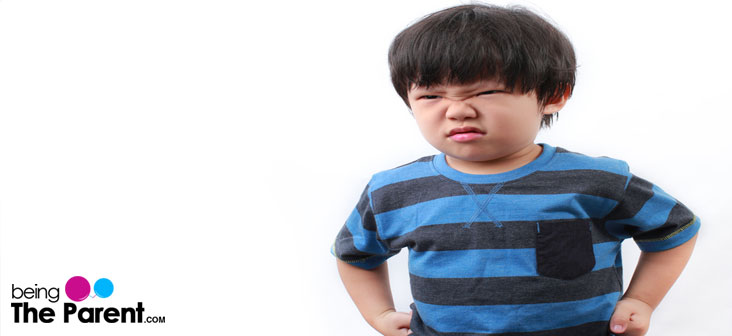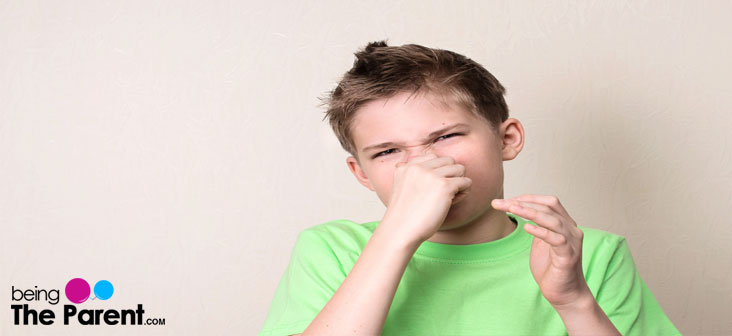
Know All About Tics In Children
5 min readWritten by Editorial Team

What do you do if your child develops a tic? Tics can be very disconcerting and annoying especially when they occur in harmless children. Read on to know all about tics, its causes, symptoms, treatments and ways to reduce its impact on children.

What Are Tics in Children?
Tic disorder is actually a neuro or brain condition that can occur even when your child is very small. Tic disorder is normally characterized by repetitive, and involuntary vocal and motor movements. This disorder is caused by some kind of abnormalities that occur in specific parts of the brain. Many disorders like obsessive compulsive disorder (OCD), impulsivity and hyperactivity have all been found to be triggered due to Tics.
Types Of Tics In Children
There are different kinds of tic disorders. Some common ones are:
- Provisional tic disorder — this disorder is very commonly found in which tics have been occurring in the child for less than a year
- Chronic (persistent) tic disorder — it is another tic disorder which is not very common. In this type of disorder, tics have been occurring in the child for over a year. Tics can be either motor or vocal but cannot be both
- Tourette syndrome – this is rare and severe form of tic disorder where motor and vocals tics occur in a child many times per day for over an year
Causes Of Tics In Children
Tics in children may be caused by the following reasons:
- You child may be undergoing extreme stress at school
- Infection of certain kind in the brain may cause tics
- Metabolic or any genetic disorder may cause tics
- The use of certain strong medications can cause tics. Some of these medicines are Ritalin, Adderall or Tegretol
Is Tics Hereditary?
Studies reveal that this is a hereditary illness and a person’s gender plays an important role as far as inheriting this disorder is concerned.
- Generally male kids are more prone to inheriting this disorder
- In most cases, this issue is lifelong even though it does not interfere with intelligence or normal life of a child
Symptoms Of Tics Disorder In Children
The common symptoms of tics can be spotted in children as early as two to five years. The main indication of this syndrome is tics that are involuntary.
-
- These tics mostly appear whenever the child becomes over excited or too stressed
- Tic patterns vary from child to child and some tics are not even noticeable to others
- The common and simple tics include some kind of eye movements like involuntary blinking of eyes, facial grimaces, or even shoulder or head jerking that is involuntary
- The vocalization tics normally involve clearing of the throat, coughing and mostly centers around the neck and head area
- When the child has quite complex tics that are vocalized, it appears in the form of urges to speak out phrases or just words
- The motor tics that are more complex include jumping, kicking, hopping or maybe touching some object
Most children, who suffer from this disorder, perform these various tics in a certain manner umpteen times until their urge to do this gets alleviated
Diagnosis Of Tics Disorder In Children
Tics disorder can never be diagnosed with a single test.
- Doctor normally observes a child with the symptoms carefully for a specific time span so that symptoms can be verified and the syndrome is diagnosed
- It usually takes almost a year in order to identify vocal and motor tics
- There is no need of a lab or blood test in order to diagnose this disorder

Treatments For Tics Disorder In Children
Extensive treatment is not required for dealing with tic disorder in children. But it is very important that teachers and members of the family don’t call attention to the tics. This can make child very self-conscious and he may feel embarrassed and this can worsen the symptoms. It’s important that family members and teachers don’t call attention to the tics. This can make the child more self-conscious and aggravate their symptoms. No medication is required to treat tic disorder it does not harm the child in any way but medication is normally prescribed only when the symptoms of this disorder begin to interfere with day to day activities of the child.
However, three most common therapies for tics include
-
- Cognitive behavioral therapy: One of the most common treatment in order to deal with tics is “comprehensive behavioral intervention” that helps children to control or restrict the urge to control their emotions, behavior or thoughts. This also includes cognitive behavioral therapy like reversal of habit, getting educated about tics and some relaxation methods
Drugs: In extreme cases, drugs are prescribed. This includes drugs like Risperidone, Pimozide, Olanzapine, Haloperidol and Clonidine. Usually the lowest possible dose is prescribed in order to make the tic tolerable and normally the dosage is lowered with the waning of tics. However these drugs have adverse effects like fatigue, akathisia etc
Treating Comorbidities: it is vital to procure treatment for Comorbidities. A child with ADHD syndrome can be helped with stimulants of low dosage without aggravating tics. A child who is struggling in school due to his or her tics requires to be assessed for any kind of learning disabilities and offered support if required
Measures On How To Control Tics In Children
There are certain steps you can take to lower the impact of tics disorder on your child.
- Do not call attention to this disorder. Make sure you, his friends and teachers do not treat him differently so that your child does not feel embarrassed as this can make it worse
- Do not pressurize your child or put any kind of stress on this as high stress levels only makes tics disorder worse
- Do not push your child to do things that are beyond his capacity. Help your child complete his or her daily homework on time
- Ensure a proper night’s sleep for your child. Any kind of anxiety and lack of rest can make the situation worse
- Encourage your child to vocalize his feelings rather than suppressing it. Ask your child to let it out when he feels that he no longer can take it
- Test for food allergies and infections if the problem persists
- Avoid artificial colors, flavors and preservatives
- Limit the usage of wheat and dairy products that can increase tics in children
- Check with your doctor and start magnesium and vitamin B supplements for your child
So relax as tics can be controlled and sometimes even wanes in its severity as the child grows up making him or her confident adult. Ensure you provide all the much needed love and support to help your child to help him deal with this disorder so that he finally blossoms into a confident adult regardless of his disorder.

Editorial Team,
With a rich experience in pregnancy and parenting, our team of experts create insightful, well-curated, and easy-to-read content for our to-be-parents and parents at all stages of parenting.Read more.
Responses (0)
Want curated content sharply tailored for your exact stage of parenting?
Related articles

Sleep Talking in Kids – Is it Common and Top Tips to Deal With

Hematuria (Blood in Urine) in Children – Causes, Symptoms and Treatment

Impact of Television on Children – Advantages and Disadvantages

Top 10 Hilarious Grandpa Jokes For Kids

Spanking Kids – Good or Bad? Exploring the Controversy

Color Blindness in Children
Sponsored content
Discover great local businesses around you for your kids.
Get regular updates, great recommendations and other right stuff at the right time.





